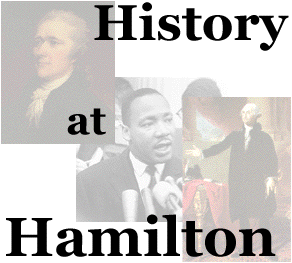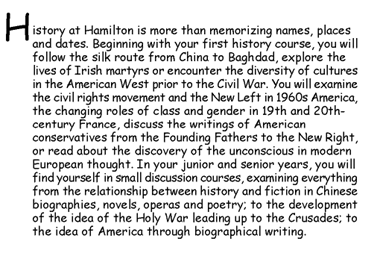
History at Hamilton
Concentration and Minor
Student Research
Senior Project
Special Opportunities
Selected Courses in History
Faculty
Alumni
Further Information


History at Hamilton
Concentration and Minor
Student Research
Senior Project
Special Opportunities
Selected Courses in History
Faculty
Alumni
Further Information

The study of history at Hamilton provides a perspective on other cultures, times and places. As a history major, you will learn research, writing and speaking skills that are valuable in many areas of life and work. Concentrators go on to a variety of careers thoroughly trained to read critically, think rigorously and write cogently and persuasively.
A history concentration requires ten courses from among any three of the following geographical areas: Africa, East Asia (China and Japan), Europe, Latin America, the Middle East, Russia and the United States.
Students are encouraged to enroll in a 100-level course during their first year. These 100-level courses vary significantly in geographic and chronological focus, but any one of them serves as a prerequisite for all 200-level courses.
A minor in history consists of five courses (one 100-level and at least one 300-level course). You might also consider a double concentration in history and another discipline in the social sciences, humanities, languages or even math or the sciences.
All Hamilton history courses stress reading textsÑ both primary sources and secondary books and articles - and writing critical papers. Advanced work at the 300-level builds on these skills in research projects on topics of the students' choosing. Some particularly interesting research papers written by history concentrators include the following:
 Motoori Norinagi Rocks 18th-Century Japan: Examination of the
Kokugaku Movement in Early Tokugawa
Motoori Norinagi Rocks 18th-Century Japan: Examination of the
Kokugaku Movement in Early Tokugawa
 The Ideal of Womanhood among the Sans-Culottes of the French
Revolution
The Ideal of Womanhood among the Sans-Culottes of the French
Revolution
 The Rhineland Jews: Murdered or Martyred?
The Rhineland Jews: Murdered or Martyred?
 Holy War Ideology in The Song of Roland and The Song of Aspremont
Holy War Ideology in The Song of Roland and The Song of Aspremont
 Insult and Invective in the Crusading Chronicles
Insult and Invective in the Crusading Chronicles
The capstone of the history concentraton is the seminar paper or honor's thesis - a semester-long research project for which the student engages in in-depth research on a specific problem. Recent seminar paper titles include:
 The British Partition of India: A Struggle between Cultures and
Conceptions of Nationalism
The British Partition of India: A Struggle between Cultures and
Conceptions of Nationalism
 The Unity of the Iroquois: The Peoples of the Longhouse in the
American Revolutionary Period
The Unity of the Iroquois: The Peoples of the Longhouse in the
American Revolutionary Period
 Burakumin: Victims of Continued Discrimination in Modern Japanese
Society
Burakumin: Victims of Continued Discrimination in Modern Japanese
Society
 French Foreign Policy Toward Germany after World War I: A Study
of France's Reaction to the Rhineland Crisis of 1936
French Foreign Policy Toward Germany after World War I: A Study
of France's Reaction to the Rhineland Crisis of 1936
 The Shift of Intellectual Paradigms in China from 1860 to 1930
and the Role of Marxism
The Shift of Intellectual Paradigms in China from 1860 to 1930
and the Role of Marxism
 Male Witchcraft in 16th and 17th-Century Europe
Male Witchcraft in 16th and 17th-Century Europe
 The AIDS Epidemic in America: A Disappointing Response
The AIDS Epidemic in America: A Disappointing Response
Guest speakers: The Department of History regularly invites distinguished historians and scholars to campus. In recent years, Prasenjit Duara of the University of Chicago spoke on nationalism, imperialism and transnationalism in Modern China; Leo Ou-fan Lee of Harvard University spoke on cultural cross-currents in the Chinese diaspora.
Study abroad: The department encourages study in rigorous programs abroad. Many history concentrators study in such foreign countries as Spain, France, Italy, England, Austria, China and Japan for at least one semester.
Awards and prizes: The department awards four prizes at the College's annual Class and Charter Day, all for high academic achievement in history. The Edgar Baldwin Graves Prize in History is awarded to the top senior in the department; the Darling Prize in American History is awarded to the senior with the most distinguished record in American history; the Putnam Prize in American History awards a gift of books for the senior with the second-most distinguished record in American history; and the Edwin B. Lee, Jr. Prize in Asian History/Asian Studies is awarded to a senior who has excelled in the study of Asian history or in Asian studies.
Honor society: Hamilton has a fully accredited chapter of Phi Alpha Theta, the national honor society in history. Students have delivered papers at regional and national meetings, and published papers in the society's journal. Phi Alpha Theta is one of the oldest and most respected national honor societies.
100-level courses: Atlantic World in the Era of the Slave Trade; Trade, Travel and Conquest in the Mediterranean, 500-1500; Introduction to East Asian Cultures; The Emergence of Modern Western Europe; The Civilization of Greece and the Near East; Women in Modern Europe; Europe since 1815; Roman Civilization; America in the World Arena, 1890-1990; The Rise of the Modern Presidency; The Silk Road: Crossroads of Cultures; Ireland: Myth and History; U.S. Women's History; The American West
200-level courses: Introduction to American Studies; African-American History; Medieval Europe; Europe in the Twentieth Century; Early Russian History; Modern Russian History; Modern European Intellectual History; The Family in Modern History; American Colonial History; The Old South; American Women and Work Through 1865; African Dimensions in Latin America; The Rise and Fall of International Communism; 19th-Century America; Recent American History; Latin America; Cultural and Political Traditions of Japan; Modern Japan; Conservative Thought in the United States; Cultural and Political Traditions of China; Modern China; Renaissance and Reformation Europe
300-level courses: The Philosophy of History; Black Reconstruction; The French Revolution; African-American Women's History; Nazi Germany; Seminar in European Intellectual History; Chinese Intellectual History; Studies in American Colonial History; Seminar: Revolutionary America; Studies in Women's History; Studies in Russian History; Slavery and the Civil War; Women and the American Social Reform Tradition; Seminar on the Sixties; Studies in American Progressivism; The Crusades; Topics in American Biography; Seminar in American Studies
400-level courses: Research Seminars in American History, European History and East Asian History Senior Thesis
All members of the department are active scholars, having earned numerous prizes for their books - including a Pulitzer nomination - and grants from such institutions as the National Endowment for the Humanities. Among their research and teaching interests are the following:
 Douglas Ambrose (Ph.D., State University of New York at Binghamton) - Early American
history; Old South
Douglas Ambrose (Ph.D., State University of New York at Binghamton) - Early American
history; Old South
 Kevin P. Grant (Ph.D., University of California at Berkeley) - England and its empires
Kevin P. Grant (Ph.D., University of California at Berkeley) - England and its empires
 Maurice Isserman (Ph.D., University of Rochester) - 20th-century American history;
political history; labor policies
Maurice Isserman (Ph.D., University of Rochester) - 20th-century American history;
political history; labor policies
 Esther S. Kanipe (Ph.D., University of Wisconsin) - European social history; modern
France; women and family
Esther S. Kanipe (Ph.D., University of Wisconsin) - European social history; modern
France; women and family
 Shoshana Keller (Ph.D., Indiana University) - Modern Russian history; Central
Asia; religion
Shoshana Keller (Ph.D., Indiana University) - Modern Russian history; Central
Asia; religion
 Alfred H. Kelly (Ph.D., University of Wisconsin) - Modern German history; European
intellectual and cultural history; science
Alfred H. Kelly (Ph.D., University of Wisconsin) - Modern German history; European
intellectual and cultural history; science
 Maureen C. Miller (Ph.D., Harvard University) - Medieval, Renaissance and Reformation
history
Maureen C. Miller (Ph.D., Harvard University) - Medieval, Renaissance and Reformation
history
 Robert L. Paquette (Ph.D., University of Rochester) - Old South; slavery; Atlantic
world
Robert L. Paquette (Ph.D., University of Rochester) - Old South; slavery; Atlantic
world
 Marcy S. Sacks (Ph.D. candidate, University of California at Berkeley) - U.S. history
history
Marcy S. Sacks (Ph.D. candidate, University of California at Berkeley) - U.S. history
history
 Eugene M. Tobin (Ph.D., Brandeis University) - 20th-century American history
(president of the College)
Eugene M. Tobin (Ph.D., Brandeis University) - 20th-century American history
(president of the College)
 Lisa N. Trivedi (Ph.D. candidate, University of California at Davis) - modern South Asian history
Lisa N. Trivedi (Ph.D. candidate, University of California at Davis) - modern South Asian history
 Thomas A. Wilson (Ph.D., University of Chicago) - East Asian history; historiography
Thomas A. Wilson (Ph.D., University of Chicago) - East Asian history; historiography
History majors go on to careers in business, communication, education, government and a variety of other fields. Others enter graduate programs in medicine, law and business. Examples include:
History majors go on to careers in business, communication, education, government and a variety of other fields. Others enter graduate programs in medicine, law and business. Examples include:
 New York State Supreme Court Justice
New York State Supreme Court Justice
 History of Religion Professor, Harvard University
History of Religion Professor, Harvard University
 Executive Vice President, National Newspaper Association
Executive Vice President, National Newspaper Association
 Director of Glaucoma Surgery, The Center for Sight (N.Y.)
Director of Glaucoma Surgery, The Center for Sight (N.Y.)
 Principal, Port Orange (Fla.) High School
Principal, Port Orange (Fla.) High School
 Major General, U.S. Army
Major General, U.S. Army
 Director, American Museum of Natural History
Director, American Museum of Natural History
 Scientist, University of Minnesota School of Public Health
Scientist, University of Minnesota School of Public Health
 Art History Professor, Dartmouth University
Art History Professor, Dartmouth University
 Vice President, Citibank, N.A.
Vice President, Citibank, N.A.
 Senior Specialist, Library of Congress
Senior Specialist, Library of Congress
 President, Woodrow Wilson National Fellowship Foundation
President, Woodrow Wilson National Fellowship Foundation
 Executive Director, Chinese-American Voters Education Committee
Executive Director, Chinese-American Voters Education Committee
For more information about the History Department at Hamilton College, call or write:
Robert Paquette, Chair
History Department
Hamilton College
198 College Hill Road
Clinton, NY 13323
(315) 859-4410
FAX: (315) 859-4632
| This page created and maintained by Matt Winterroth |
10.13.98